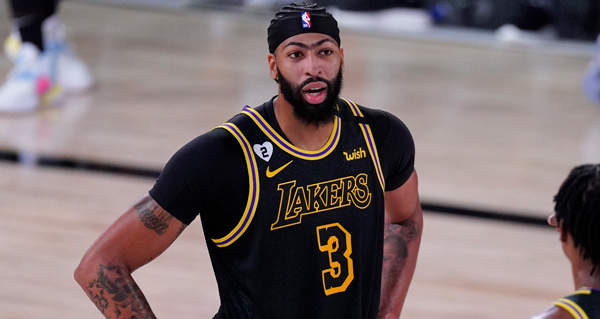The pose is kind of anti-excitement. You are not only not happy that you’ve qualified for the NBA Finals, but you’re disappointed that anyone would think that you’re happy about it, because this is just one more step toward a goal unaccomplished, in a season measured in absolute failure or absolute success. So LeBron James sits on the confetti’d floor in his socks, almost pouting, and Jimmy Butler sleepwalks through a postgame interview as if the Heat had just beaten the Hornets in mid-January. It’s corny kayfabe all the way down, living out Wieden+Kennedy ad copy, performing for a mostly imaginary audience of media hardasses, trying to trick the mind into something it’s already convinced of. LeBron is his own biographer, Anthony Davis made himself quite a villain just to get to Los Angeles, nobody in the Heat’s rotation, Andre Iguodala excepted, has won anything of consequence before. The stakes are self-evident. Motivation isn’t going to be an issue. Even if Bam Adebayo wanted to blow off some mid-series steam and get lost in a bar until four a.m., that option isn’t available. Everyone is focused on the task at hand.
For the past decade, NBA writers have been searching, as if on a cryptid hunt, for Spurs East: the lesser conference’s model organization. While the Spurs’ sustained success, which only recently began to flag, is its own irreplicable thing, the Heat are probably their most worthy facsimile. And actually, the Heat established themselves a little bit before the Popovich and Duncan Spurs came into being. While Popovich was firing Bob Hill and assuming full control of his Duncan-seeking tank job, Pat Riley won 61 games in 1996-97, his second season as the Heat’s hegemon, losing in the Conference Finals to Jordan’s Bulls. The Heat were arguably the second-best team in the league that year, and had Alonzo Mourning not been suspended for the series-deciding Game 5 against the Knicks the following season, that campaign might have featured a title push too.
That was the first of four pretty great runs for the Heat, all of which have occurred over the past 25 years. There was young Dwyane Wade and old Shaq in the mid-aughts, the LeBron-Wade-Bosh triptych, and now this mix-and-match squad, a collection of cast-offs and draft picks, that’s currently radiating intense 2004 Detroit Pistons vibes. They’re smart, deep, and tough as hell, and though nobody on the squad except Udonis Haslem—essentially an assistant coach who counts against the salary cap—has any connection to the franchise’s various championship-contending eras, there is a sort of winner-y glow about them, a sense that they understand what needs doing and how to do it. Erik Spoelstra’s an even better strategist than Riley was, and Riley himself is sitting in the stands, just a mask and that iconic head of hair. History doesn’t suit up, maybe it doesn’t matter at all on the hardwood, but if you have a choice between having Pat Riley in your corner and not having him, being the Heat or having the same players in Magic jerseys, one instills more confidence than the other.
Jimmy Butler, recently imported from Philadelphia, having burned his way out of Minnesota, having been shipped out of Chicago, seems to already belong to broader Heat tradition. A quote from late August: “I’m willing to do whatever it takes to win. I would like to think that I’m a winning player. I haven’t won what I want to win yet, but I’m not a loser.” Jimmy’s not as much of a maniac as he sometimes pretends to be; he’d be a hugely detrimental player if he was. He’s walked the walk in these playoffs, taking surprisingly few shots for a star and ceding the offense to the hot hand in crunchtime. He’s happy to play defense and facilitate, let Bam or Tyler Herro take over when they’re looking good. He wants credit, of course he does, but whatever Spoelstra and Riley have told him to do, he’s done without any visible complaint. Jimmy’s outsize public persona suggests that he’s going to spend these Finals in a gunfight with LeBron, but if you’ve been watching him lately, you know that’s not actually going to happen. He’s smart enough to know staring down LeBron by himself is a losing proposition. If the Heat are going to overcome the Lakers, they’re going to do it as a team. A lot of stars are lying—not maliciously, but they can’t help themselves—when they say that they don’t need to score 25 points to enjoy a victory. Jimmy’s sincere. He really is a winning player.
And LeBron is a winning enterprise unto himself. And Anthony Davis hasn’t yet met a moment too big for him, even outplaying his more famous teammate in a handful of games during this championship run. We’ve taken a circuitous route to these Finals, and perhaps the Heat aren’t in the competition if it were being staged in June, but it feels correct that they’re here now, after handily outplaying the Bucks and the Celtics, two of the three other Eastern Conference squads you would have picked to make the Finals before the pandemic shut the league down. This is the end of a singularly strange season, but at this point, the strangeness is at a minimum. These are two legibly very good teams, and now we find out which one deserves to be called great.



